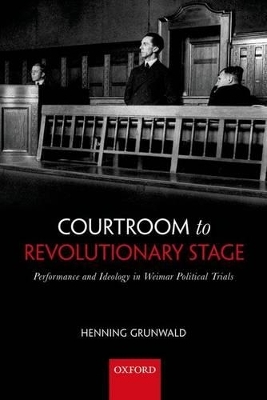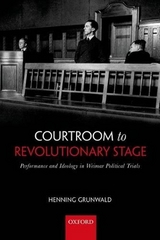Courtroom to Revolutionary Stage
Oxford University Press (Verlag)
978-0-19-960904-8 (ISBN)
What role did the courts play in the demise of Germany's first democracy and Hitler's rise to power? Courtroom to Revolutionary Stage challenges the orthodox interpretation of Weimar political justice. Henning Grunwald argues that an exclusive focus on reactionary judges and a preoccupation with number-crunching verdicts has obscured precisely that aspect of trials most fascinating to contemporary observers: their drama. Drawing on untapped sources and material previously inaccessible in English, Grunwald shows how an innovative group of party lawyers transformed dry legal proceedings into spectacular ideological clashes. Supported by powerful party legal offices (which have hitherto escaped scholarly notice almost entirely), they developed a sophisticated repertoire of techniques at the intersection of criminal law, politics, and public relations.
Harnessing the emotional appeal of tens of thousands of trials, Communists and (emulating them) National Socialists institutionalized party legal aid in order to build their ideological communities. Defendants turned into martyrs, trials into performances of ideological self-sacrifice, and the courtroom into 'revolutionary stage', as one prominent party lawyer put it. It is this political justice as 'revolutionary stage' that most powerfully impacted Weimar political culture.
While it helps to explain Weimar's demise, this argument about the theatricality of justice transcends interwar Germany. Trials were compelling not because they offered instruction about the revolutionary struggle, but because in a sense they were the revolutionary struggle. The ideological struggle, their message ran, left no room for fairness, no possibility of a 'neutral platform': justice was unattainable until the Republic was destroyed.
Henning Grunwald is DAAD Visiting Assistant Professor at Vanderbilt University and teaches modern German and European history. He graduated with first class Honors and received his Ph.D. in 2003, both from the University of Cambridge. Grunwald has held positions as a postdoctoral fellow at the Institute for Theatre Studies at Freie Universität Berlin, as Assistant for Academic Strategy to the President of Humboldt-Universität zu Berlin and was a Visiting Scholar in Columbia University's Department of History. He has published on the history of the notion of crisis (with Manfred Pfister), on the performativity of justice, and on Holocaust memorialization and European identity.
Introduction ; 1. The Rosa Luxemburg Trials of 1914 and the Emergence of the Ideal Type of the Weimar Party Lawyer ; 2. 'Nursing Revolutionary Fighters' and 'Legal SA-Duty': Ten Political Lawyers ; 3. 'To Fight the Class Struggle with the Bourgeois Courts with all Acridity': The Communist Party Legal Organization ; 4. The Compliment of Imitation: The Rise (and Rivalry) of National-Socialist Legal Organizations ; 5. Performing Ideology: Rethinking Weimar Political Justice ; Conclusion ; Appendix A: Party allegiance of 36 prominent political lawyers in the Weimar Republic ; Appendix B: Occupation of 100 lay magistrates in political trials ; Appendix C: The hierarchy of the German court system ; Bibliography
| Erscheint lt. Verlag | 27.9.2012 |
|---|---|
| Verlagsort | Oxford |
| Sprache | englisch |
| Maße | 162 x 241 mm |
| Gewicht | 550 g |
| Themenwelt | Geschichte ► Allgemeine Geschichte ► Neuzeit (bis 1918) |
| Geschichte ► Allgemeine Geschichte ► 1918 bis 1945 | |
| Geisteswissenschaften ► Geschichte ► Regional- / Ländergeschichte | |
| Geschichte ► Teilgebiete der Geschichte ► Militärgeschichte | |
| Recht / Steuern ► EU / Internationales Recht | |
| Recht / Steuern ► Rechtsgeschichte | |
| Sozialwissenschaften ► Politik / Verwaltung | |
| ISBN-10 | 0-19-960904-7 / 0199609047 |
| ISBN-13 | 978-0-19-960904-8 / 9780199609048 |
| Zustand | Neuware |
| Haben Sie eine Frage zum Produkt? |
aus dem Bereich




